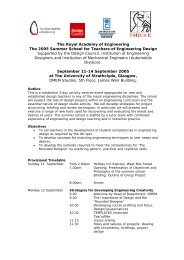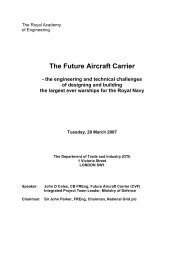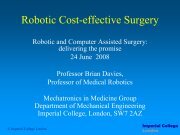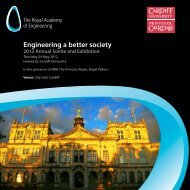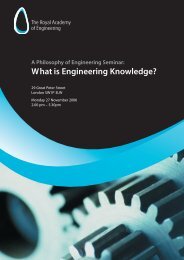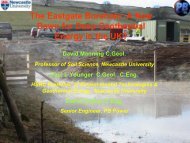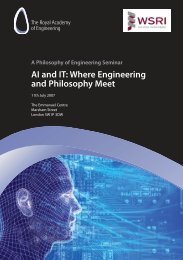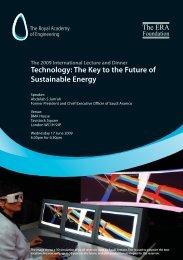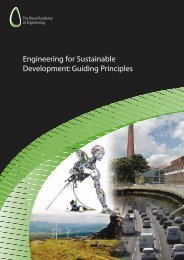The case for Centres of Excellence in sustainable building design
The case for Centres of Excellence in sustainable building design
The case for Centres of Excellence in sustainable building design
Create successful ePaper yourself
Turn your PDF publications into a flip-book with our unique Google optimized e-Paper software.
Low carbon construction skills<br />
Dur<strong>in</strong>g 2009 approximately 39% <strong>of</strong> people work<strong>in</strong>g <strong>in</strong> construction received<br />
tra<strong>in</strong><strong>in</strong>g funded or provided by their employer, a slight <strong>in</strong>crease over 2008,<br />
but this is ma<strong>in</strong>ly as a result <strong>of</strong> the recession reduc<strong>in</strong>g employment <strong>in</strong> the<br />
sector overall. That proportion <strong>in</strong>creased aga<strong>in</strong> <strong>in</strong> 2011 to 41% <strong>of</strong> employers.<br />
Unsurpris<strong>in</strong>gly the amount <strong>of</strong> tra<strong>in</strong><strong>in</strong>g <strong>in</strong>creases with the size <strong>of</strong> organisation.<br />
<strong>The</strong> recession has also had an impact on the number <strong>of</strong> employers report<strong>in</strong>g<br />
problems aris<strong>in</strong>g from a lack <strong>of</strong> skilled staff, with very few now identify<strong>in</strong>g a<br />
shortfall <strong>in</strong> skilled staff compared to their workload, presumably due to the<br />
reduced demand overall. However <strong>in</strong> 2008 45% <strong>of</strong> all construction employers<br />
had lacked sufficient skilled staff <strong>for</strong> their bus<strong>in</strong>ess and 29% had experienced<br />
difficulties <strong>in</strong> recruit<strong>in</strong>g skilled staff.<br />
Deliver<strong>in</strong>g low carbon skills<br />
Whilst it has traditionally been the preserve <strong>of</strong> the universities to teach theory<br />
and leave the teach<strong>in</strong>g <strong>of</strong> application to <strong>in</strong>dustry, the rate <strong>of</strong> change required<br />
<strong>in</strong> the construction <strong>in</strong>dustry calls <strong>for</strong> a radical trans<strong>for</strong>mation <strong>in</strong> education <strong>for</strong><br />
construction pr<strong>of</strong>essionals. To meet the demands <strong>of</strong> low carbon construction, it<br />
will be necessary, <strong>in</strong> the short term at least, <strong>for</strong> universities to contribute to the<br />
development <strong>of</strong> readily applicable skills and knowledge ready <strong>for</strong> the <strong>in</strong>dustry.<br />
<strong>The</strong> pr<strong>in</strong>ciples <strong>of</strong> build<strong>in</strong>g science necessary to eng<strong>in</strong>eer the passive energy<br />
conserv<strong>in</strong>g elements <strong>of</strong> build<strong>in</strong>gs are now essential <strong>in</strong> the education <strong>of</strong> anyone<br />
who will <strong>design</strong> or specify the environmental per<strong>for</strong>mance <strong>of</strong> build<strong>in</strong>gs <strong>in</strong> the<br />
low carbon economy. <strong>The</strong> problem is that these pr<strong>in</strong>ciples are rarely covered<br />
<strong>in</strong> undergraduate or subsequent pr<strong>of</strong>essional tra<strong>in</strong><strong>in</strong>g and not at all amongst<br />
<strong>in</strong>stallers and tradesmen <strong>in</strong> the <strong>in</strong>dustry.<br />
Recent <strong>in</strong>itiatives by the construction sectors skills councils are beg<strong>in</strong>n<strong>in</strong>g to<br />
address low carbon construction and <strong>in</strong>stallation skills, but skills development<br />
<strong>for</strong> pr<strong>of</strong>essional <strong>design</strong>ers and constructors is left largely to the pr<strong>of</strong>essional<br />
<strong>in</strong>stitutions and little concerted ef<strong>for</strong>t has been seen <strong>in</strong> this sector.<br />
Current provision <strong>of</strong> undergraduate teach<strong>in</strong>g<br />
Build<strong>in</strong>g science used to be <strong>of</strong>fered at degree level by a number <strong>of</strong> UK universities<br />
but these courses have gradually been subsumed <strong>in</strong>to general eng<strong>in</strong>eer<strong>in</strong>g<br />
degrees. <strong>The</strong> courses on <strong>of</strong>fer <strong>in</strong> the UK that teach, at best, some elements <strong>of</strong><br />
build<strong>in</strong>g science are generally build<strong>in</strong>g services eng<strong>in</strong>eer<strong>in</strong>g degrees and there<br />
are very few <strong>of</strong> these. Some universities <strong>of</strong>fer general construction eng<strong>in</strong>eer<strong>in</strong>g;<br />
cover<strong>in</strong>g aspects <strong>of</strong> build<strong>in</strong>g physics and build<strong>in</strong>g services eng<strong>in</strong>eer<strong>in</strong>g alongside<br />
structural eng<strong>in</strong>eer<strong>in</strong>g, on courses described as architectural eng<strong>in</strong>eer<strong>in</strong>g.<br />
<strong>The</strong> Chartered Institution <strong>of</strong> Build<strong>in</strong>g Services Eng<strong>in</strong>eers (CIBSE) presently<br />
accredits only 23 UK undergraduate degrees from 12 <strong>in</strong>stitutions, <strong>in</strong>clud<strong>in</strong>g the<br />
Open University [CIBSE 2011]. Of these degrees, only three courses <strong>of</strong> full time<br />
study and one from the Open University lead to the award <strong>of</strong> MEng and so satisfy<br />
the requirements <strong>of</strong> the Eng<strong>in</strong>eer<strong>in</strong>g Council qualification <strong>of</strong> Chartered Eng<strong>in</strong>eer<br />
without additional studies.<br />
<strong>The</strong> guidel<strong>in</strong>es <strong>for</strong> accreditation <strong>of</strong> undergraduate degrees by CIBSE require that<br />
fundamentals <strong>of</strong> eng<strong>in</strong>eer<strong>in</strong>g and build<strong>in</strong>g science comprise 25% <strong>of</strong> the taught<br />
content, the rema<strong>in</strong>der be<strong>in</strong>g specific build<strong>in</strong>g services eng<strong>in</strong>eer<strong>in</strong>g or general<br />
pr<strong>of</strong>essional topics.<br />
<strong>The</strong> <strong>case</strong> <strong>for</strong> <strong>Centres</strong> <strong>of</strong> <strong>Excellence</strong> <strong>in</strong> susta<strong>in</strong>able build<strong>in</strong>g <strong>design</strong> 27






